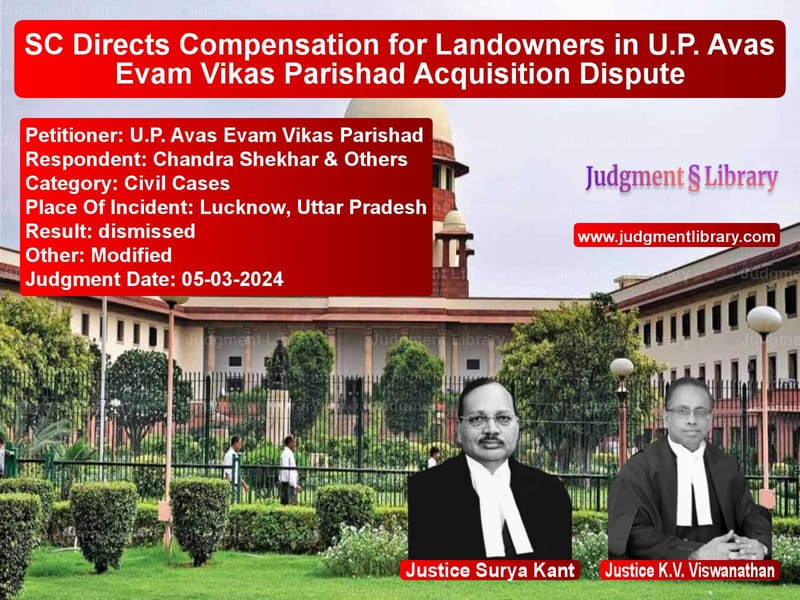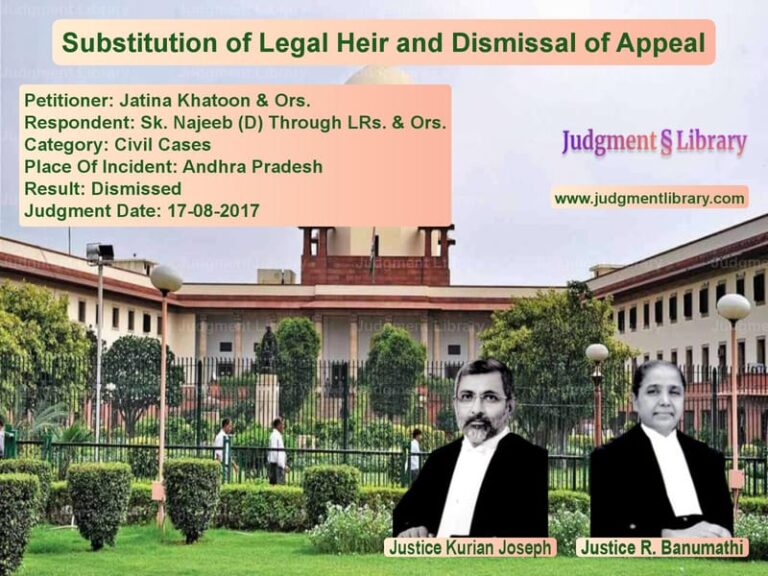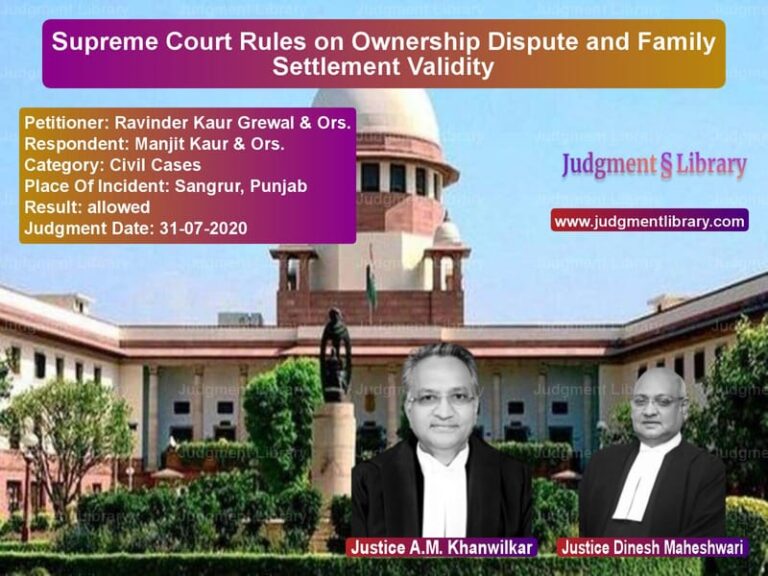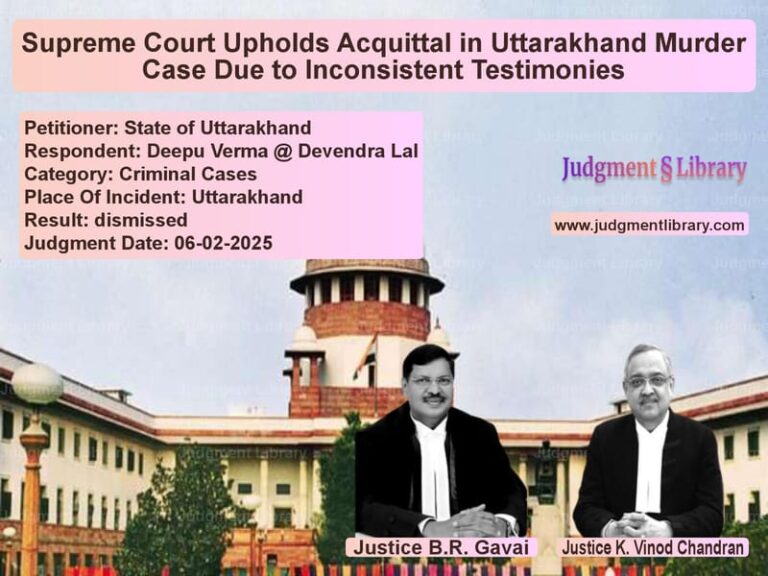SC Directs Compensation for Landowners in U.P. Avas Evam Vikas Parishad Acquisition Dispute
The Supreme Court of India has ruled in favor of landowners in a crucial land acquisition dispute involving the U.P. Avas Evam Vikas Parishad (the Board). The case, U.P. Avas Evam Vikas Parishad vs. Chandra Shekhar & Others, revolved around the acquisition of land in Lucknow under a housing development scheme. The landowners challenged the acquisition on the grounds that they were not given an opportunity to submit objections as required under the U.P. Avas Evam Vikas Parishad Adhiniyam, 1965.
The Allahabad High Court had quashed the acquisition process for the disputed land (Khasra No. 673) due to procedural lapses. The Supreme Court upheld this decision, affirming that the failure to serve proper notice deprived landowners of their legal rights. However, recognizing the substantial public development that had already taken place, the Court directed that compensation be provided under the Right to Fair Compensation and Transparency in Land Acquisition, Rehabilitation and Resettlement Act, 2013.
Background of the Case
The dispute arose from the Board’s Sultanpur Road Bhoomi Vikas Evam Grahsthan Yojna in Lucknow, aimed at urban development. Under this scheme:
- A notice was issued on July 17, 2004, detailing the land parcels earmarked for acquisition.
- The notice did not include Khasra No. 673, the land owned by the respondents.
- The landowners (Chandra Shekhar & Others) argued that they were deprived of the right to file objections under Section 29 of the 1965 Act.
- Despite their exclusion from the notification, their land was acquired without individual notice.
The respondents challenged the acquisition before the Allahabad High Court, which ruled in their favor, leading to an appeal by the Board before the Supreme Court.
Legal Issues Considered
1. Was the Land Acquisition Process Lawful?
The key question was whether the acquisition of Khasra No. 673 was legally valid despite the absence of specific notification and individual notice to the landowners.
2. Were Landowners Deprived of Their Right to File Objections?
Under Section 29 of the 1965 Act, landowners must be given an opportunity to object before their land is acquired. The respondents argued that they were never informed, violating their legal rights.
3. Should the Acquisition Be Upheld or Compensation Be Provided?
Given that significant public development had already taken place on the acquired land, the Court had to decide whether to return the land or award compensation.
Arguments Presented
Petitioner’s Arguments (U.P. Avas Evam Vikas Parishad)
- The Board argued that the acquisition process was conducted in compliance with the law.
- It contended that notice was served to the recorded tenure holders, which at the time included individuals named Chandrika and Guruprasad, instead of the respondents.
- The Board maintained that the respondents’ names were not in the revenue records at the time of notification.
Respondent’s Arguments (Chandra Shekhar & Others)
- The respondents claimed that they were the rightful landowners and had been unfairly excluded from the acquisition notice.
- They alleged that the revenue records were altered fraudulently to remove their names.
- They argued that, without proper notice, they were denied the chance to challenge the acquisition, making the process illegal.
Supreme Court’s Observations
1. Failure to Serve Notice Violates Legal Rights
The Court upheld the High Court’s ruling that the failure to serve notice deprived the respondents of their statutory rights under Section 29 of the 1965 Act. It stated:
“In the absence of any public or individual notice proposing to acquire Khasra No. 673, the respondents have been denied an effective opportunity to submit objections.”
2. Landowners Entitled to Compensation Under the 2013 Act
While quashing the acquisition, the Court recognized that the land had already been substantially developed for public purposes. Instead of restoring the land, the Court directed that compensation be paid under the Right to Fair Compensation and Transparency in Land Acquisition, Rehabilitation and Resettlement Act, 2013, stating:
Read also: https://judgmentlibrary.com/supreme-court-upholds-validity-of-will-in-family-property-dispute-2/
“The tenure-holders shall be entitled to compensation as per Section 24(1) of the 2013 Act.”
3. Expedited Compensation Process Ordered
The Court set strict deadlines for determining compensation:
- The government must notify affected landowners within six weeks.
- Landowners must file objections within four weeks.
- The final award must be passed by June 30, 2024.
4. Compensation to Be Deposited in a Nationalized Bank
To prevent disputes, the Court ordered that the compensation be deposited in a nationalized bank until ownership is conclusively determined.
“The awarded amount shall be kept in a nationalized bank in an FDR where it can fetch the maximum rate of interest.”
Final Verdict
The Supreme Court ruled:
- The acquisition of Khasra No. 673 was invalid due to procedural lapses.
- The respondents are entitled to compensation under the 2013 Act.
- The Board must complete the compensation process by June 30, 2024.
- The compensation amount will remain in an FDR until ownership disputes are settled.
- The Board can proceed with using the land for public purposes after depositing compensation.
Key Takeaways
- Failure to serve notice can invalidate land acquisition: Landowners must be properly notified before acquisition.
- Compensation must be fair and timely: If land is acquired without due process, compensation must align with the latest laws.
- Revenue record manipulation is a serious issue: Courts will scrutinize changes made to ownership records.
- Public interest vs. private rights: Courts seek to balance urban development with the rights of landowners.
This ruling reinforces the importance of procedural compliance in land acquisition cases, ensuring fairness to landowners while enabling public development projects.
Petitioner Name: U.P. Avas Evam Vikas Parishad.Respondent Name: Chandra Shekhar & Others.Judgment By: Justice Surya Kant, Justice K.V. Viswanathan.Place Of Incident: Lucknow, Uttar Pradesh.Judgment Date: 05-03-2024.
Don’t miss out on the full details! Download the complete judgment in PDF format below and gain valuable insights instantly!
Download Judgment: u.p.-avas-evam-vikas-vs-chandra-shekhar-&-ot-supreme-court-of-india-judgment-dated-05-03-2024.pdf
Directly Download Judgment: Directly download this Judgment
See all petitions in Property Disputes
See all petitions in Damages and Compensation
See all petitions in Judgment by Surya Kant
See all petitions in Judgment by K.V. Viswanathan
See all petitions in dismissed
See all petitions in Modified
See all petitions in supreme court of India judgments March 2024
See all petitions in 2024 judgments
See all posts in Civil Cases Category
See all allowed petitions in Civil Cases Category
See all Dismissed petitions in Civil Cases Category
See all partially allowed petitions in Civil Cases Category







